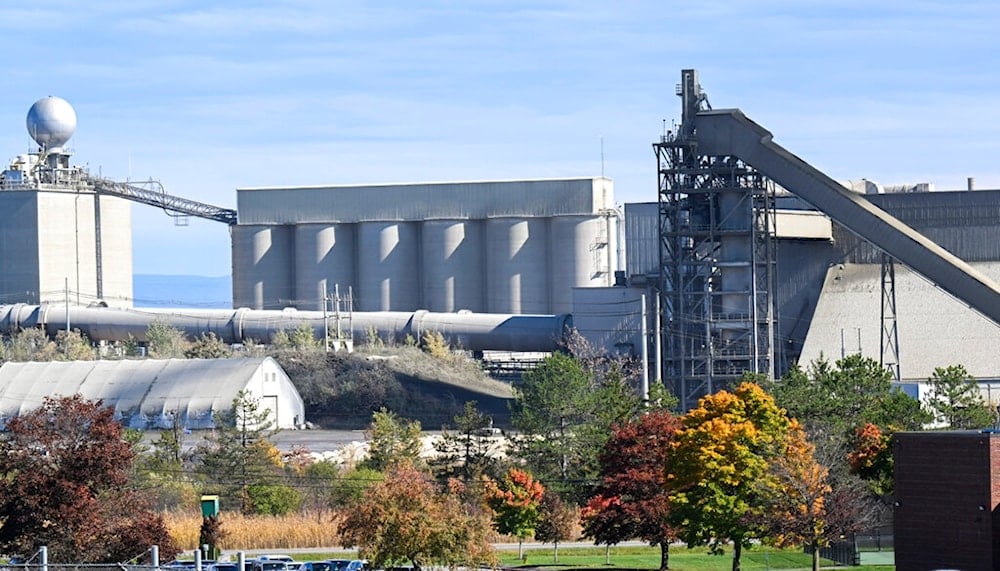Lafarge trial focuses on talks with Syrian armed groups, ISIS links
French court hears how Lafarge negotiated with Syrian armed groups, including ISIS, amid terrorism financing allegations.
-

The Lafarge cement plant facility is seen on Tuesday, October 18, 2022, in Ravena, NY. (AP)
A French court has turned its attention to how Lafarge maintained operations in Syria in 2013 and 2014 by negotiating with Syrian armed groups, including ISIS, amid the war on the country.
The company and eight former executives are on trial in Paris, accused of financing terrorism. Lafarge, as a legal entity, faces charges related to payments allegedly made to militant groups to protect its interests and continue production at its cement plant in northern Syria.
During the hearing, judges questioned former Lafarge executives about the company’s ties with militants, including meetings and financial arrangements.
Bruno Lafont, former CEO of the company, testified, “Until Aug. 27, 2014, I never suspected that payments had been made to terrorist organizations.” He added that he would have shut down the plant earlier had he been aware of such contacts.
Keeping operations running; a priority
Bruno Pescheux, who served as CEO of Lafarge Cement Syria (LCS) from 2008 to 2014, said his focus was on keeping operations running. “These payments were intended to allow our employees to move around freely,” he said.
He acknowledged that Firas Tlass, a Syrian intermediary, held several meetings with members of the ISIS terrorist group.
Commenting on a payment breakdown found in an email, Pescheux said, “I had no means to verify whether the groups listed actually received the amounts indicated.”
Read more: Lafarge's dealings with ISIS may reshape corp. accountability: Report
Defendants cite security concerns, operational pressure
Ahmad Al Jaloudi, a Jordanian national and former security manager for Lafarge in Syria, stated that Bashir Hadad, Tlass’ representative, was his main contact for resolving issues, including with ISIS.
He admitted to meeting with an ISIS member in November 2013 “to obtain information about nine trucks whose movement had been blocked.”
Christian Herrault, former deputy director general of operations, said the payments to armed groups started in October 2012 and that Lafont had been made aware of the negotiations.
“I told him that the negotiations had taken place,” Herrault testified.
Frédéric Jolibois, who led Lafarge Cement Syria between 2014 and 2016, said the company operated under extreme pressure at the time, which shaped the decisions taken on the ground.
Read more: PIJ slams claims of military buildup in Syria as fabrications
Lafarge accused of financing terrorism in Syria
The financing terrorism charges stem from allegations that Lafarge paid various armed factions, including ISIS in Syria, to safeguard its facilities and supply chains.
A 2021 report by Anadolu claimed that Lafarge cement was used by ISIS to construct tunnels and shelters.
According to the report, the company’s internal records also suggested that payments were made with full knowledge of the volatile political and militant landscape.
French intelligence services reportedly informed
Documents cited in the Anadolu report indicate that French intelligence services were regularly briefed by Lafarge about its contacts with ISIS.
The documents suggest no French state or intelligence body formally warned the company that its dealings might constitute a breach of anti-terrorism financing laws.
The judicial investigation into Lafarge’s Syria operations began in 2017. In October 2024, a panel of judges ruled that Lafarge and four of its former executives would face trial for financing a terrorist organization and violating a European Union embargo prohibiting financial dealings with terrorist groups.

 4 Min Read
4 Min Read








